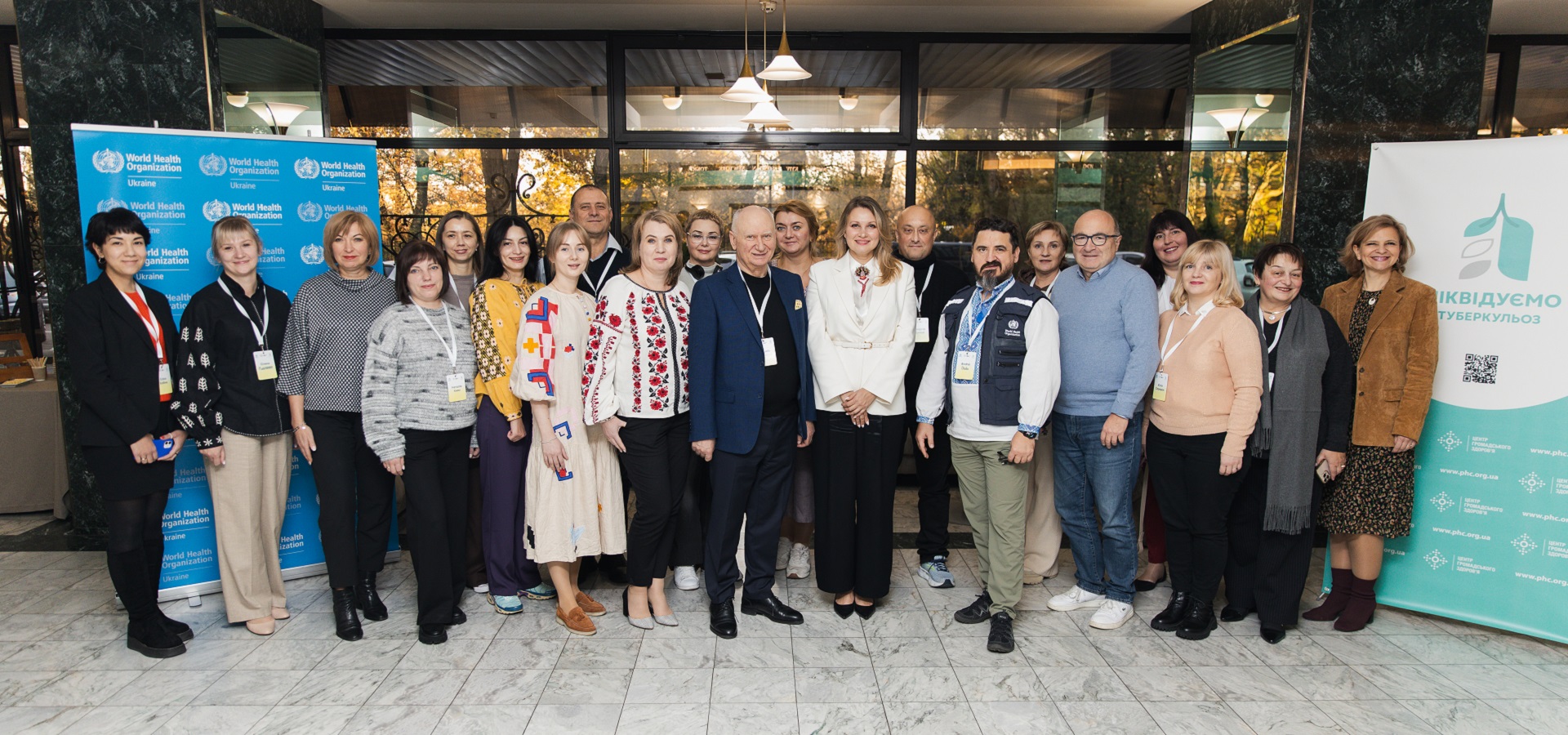Event highlights
18 November 2024
Strengthening tuberculosis prevention and systematic screening in Ukraine
Highlights of the round table on “Systematic screening and preventive treatment for tuberculosis in Ukraine: a proposal from the PASS initiative”
On 6–7 November 2024, the WHO Country Office in Ukraine and WHO/Europe hosted a round-table discussion in Lviv, Ukraine, on systematic screening and preventive treatment for tuberculosis (TB) in the country.
The event gathered a comprehensive group of stakeholders, including representatives of the National Tuberculosis Programme (NTP), the Public Health Centre of Ukraine, research institutions, universities and nongovernmental organizations, as well as health-care professionals, complimented by experts from all three WHO levels: headquarters, the European Region, and the Country Office in Ukraine.
This round-table represented the final stage of the national consultations in Ukraine, started earlier this year, to strengthen national TB policies and the capacities of service delivery actors.
During the round-table, WHO experts presented the results of the analysis of cascade of care provision along patient pathways; mathematical modelling of the most effective screening algorithms in key populations using tools with the highest specificity and sensitivity, considering the economic feasibility and the context of Ukraine’s situation with TB; and recommendations on systematic screening and preventive treatment. These technical recommendations provide the basis for the Ministry of Health of Ukraine and the Public Health Center to strengthen the existing national TB programme.
Context and challenges
The ongoing war has severely impacted Ukraine’s TB health-care infrastructure. Many TB facilities have been damaged, and essential services like hospital and ambulatory care, biological sample transport, and active case finding have faced significant disruptions. The rapidly changing nature of high-risk exposures, such as those in bomb shelters and congregate settings, adds complexity to TB management efforts. Additionally, a notable outflow of health-care personnel has occurred, with approximately 15–20% of TB specialists having left the country.
Despite these challenges, the Ministry of Health and the NTP have maintained effective management to ensure access to TB-related services. Efforts include direct support and supervision of regional TB services, securing the supply of necessary medications and implementing emergency interventions to sustain TB care continuity in these challenging times.
TB prevention and systematic screening
The new operational context in the WHO European Region, including recovery from the pandemic and the humanitarian crisis precipitated by the full-scale invasion of Ukraine, coupled with the availability of new options for TB prevention, diagnosis, treatment and service delivery, requires an accelerated, flexible and targeted response to ensure TB elimination by 2030 in the Region.
Mathematical models show that TB preventive treatment (TPT) and systematic screening are the interventions with the highest impact on the TB epidemic, and may accelerate TB elimination. Prerequisites for this impact are such essentials as rapid diagnosis and patient-oriented treatment.
TPT reduces the risk of TB infection progressing to active TB disease. Without the implementation of good measures for airborne infection control and vaccination of children with the Bacillus Calmette–Guérin (BCG) vaccine, sustained benefits from TPT may be jeopardized due to the high risk of reinfection.
Meanwhile, systematic screening involves proactively identifying individuals at high risk of TB in predefined target populations through rapid tests and examinations. WHO emphasizes this approach as a critical strategy for improving early detection and minimizing diagnostic delays, thereby reducing the risk of unfavourable treatment outcomes, health sequelae, and TB’s adverse social and economic consequences for individuals and their families. Complimentarily, systematic screening reduces TB infection transmission in a household, workplace, school or other community setting by removing people with prevalent disease and shortening the duration of infectiousness. This reduces the incidence of TB infection and, consequently, the incidence and prevalence of TB disease. When implemented with an effective algorithm for screening and diagnostic testing and then integrated with TPT for people without TB disease but at elevated risk of progression, the health of individuals and the community will be improved.
Expected output
The new WHO recommendations, presented during the round-table, aim to align Ukraine’s policies with the “Tuberculosis action plan for the WHO European Region, 2023–2030”, and complement the existing good practices of essential service provision along patient pathways for those with active TB disease. Focusing on programmatic management of latent TB infection aims to achieve interoperable linkage between TB, HIV, primary health care and public health services; expand TPT coverage among people living with HIV; intensify TB screening among people who were in household or close contact with active TB disease; and increase access to shorter and more people-oriented TPT regimens, including management of drug-resistant TB contacts.
Event notice
The WHO Country Office in Ukraine and WHO/Europe will conduct the round table “Systematic screening and preventive treatment for tuberculosis in Ukraine: a proposal from the PASS initiative”.
This event will be conducted in collaboration with the Ministry of Health of Ukraine and the Public Health Centre of Ukraine. The round table will become a final step for WHO’s implementation of standards in prevention and systematic screening. It is a part of the European Prevention and Systematic Screening Initiative to End TB (PASS to End TB) run by WHO/Europe and funded by the joint USAID/WHO project “Regional Platform to End TB in Eastern Europe”. Activities conducted in Ukraine are supported by the Austrian Ministry of Social Affairs, Health, Care, and Consumer Protection.
The main purpose of the round table is to present WHO technical recommendations for Ukraine for the revision of the national policy on the systematic screening of active TB disease and preventive treatment of latent TB infection.
Expected participants include experts from WHO/Europe, the Public Health Centre of Ukraine, research institutions, universities, scientists, health-care professionals and nongovernmental organizations, among others.





